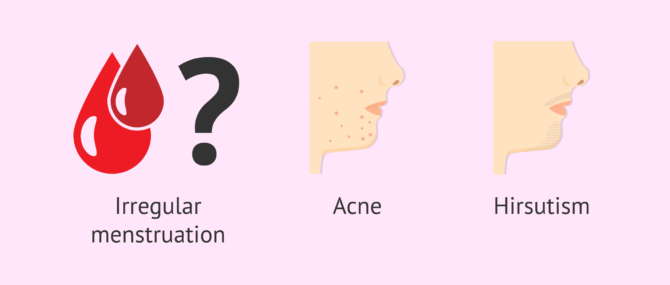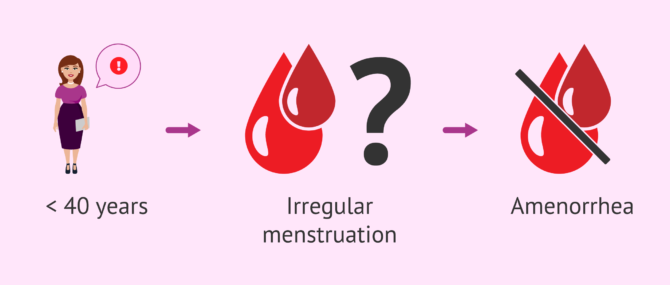Menstrual period irregularities can have various causes or reasons, although it is common that, when faced with a menstrual delay, pregnancy is thought of.
Among these causes, some of them will involve a temporary menstrual delay that will disappear once the reason for the delay ceases. However, on other occasions, menstrual delay may be indicative of a disorder that requires medical treatment.
Provided below is an index with the 7 points we are going to expand on in this article.
- 1.
- 2.
- 2.1.
- 2.2.
- 2.3.
- 2.4.
- 3.
- 4.
- 4.1.
- 4.2.
- 4.3.
- 5.
- 6.
- 7.
when does a menstrual delay occur?
A menstrual delay occurs when menstruation does not come on the expected date. Although it is very common to relate the delay in menstruation with pregnancy, the truth is that there are many other causes that may be producing it.
Generally, having an occasional delay in menstruation is not indicative of a problem. However, if the delay is prolonged or occurs frequently, a specialist should be consulted so that the causes can be assessed.
Thus, if your menstrual period is late, it may be advisable to wait about 10 days to see if your menstruation stops before going to the gynecologist.
what can cause a menstrual delay?
Menstrual delay may be caused by different reasons, among which are the following.
Pregnancy
Pregnancy involves the cessation of menstrual cycles, so it is one of the best known causes of missed periods. If a woman of childbearing age has sexual intercourse, there is a possibility that she may be pregnant if her menstrual period is delayed. Therefore, it is important to do a pregnancy test, even if contraceptive methods have been used.
Urine pregnancy tests, which are readily available in pharmacies, provide a reliable result once there is already a delay in menstruation. For this reason, these pregnancy tests are a good initial option for a woman to find out if she has a delay in her menstrual period.
A positive result in the pregnancy test confirms this as the cause of the delay in menstruation, while a negative result makes it necessary to look for other possible reasons.
However, if the result is negative, it may be advisable to repeat the test a few days later, especially if the woman has pregnancy symptoms such as nausea and breast tenderness. The reason is that the pregnancy test may have been performed too early and the hCG hormone (the pregnancy hormone) had not yet reached levels detectable by the test.
You can read more about pregnancy tests in the following article: When should you take a pregnancy test for it to be reliable?
Polycystic ovary syndrome (PCOS)
Polycystic ovary syndrome (PCOS) is a relatively common endocrine disorder. It is characterized by the fact that the woman may present oligoovulation or anovulation, hyperandrogenism (excess of male hormones) and polycystic ovaries by ultrasound.
Thus, due to hormonal imbalances, it is common for women with PCOS to have irregular menstrual periods, as well as other symptoms such as acne or hirsutism (presence of hair in typically male areas).
If you would like to learn more about PCOS, you can visit this link: Polycystic ovary syndrome (PCOS): causes, symptoms and treatment.
Premature ovarian insufficiency (POI)
Premature ovarian insufficiency (POI) occurs when the activity of the ovaries is impaired before the age of 40. The causes may be genetic, immunological, some infections, chemo or radiotherapy treatments and ovarian surgery, among others, although in many cases they are unknown.
In women with IOP, there may be irregularities in the menstrual cycle before there is a complete absence of menstruation (amenorrhea).
You can continue reading more in depth about IOP in the following article: What is early ovarian failure (POI) - Causes and Treatment.
Other causes
In addition to those mentioned, there may be other causes of a delay in menstruation. Among them are:
- Stress.
- Intense exercise (elite sports).
- Restrictive diet.
- Rapid weight change.
- Eating disorders.
- Schedule changes, for example, due to work shifts or travel.
- Cessation of hormonal contraceptives and use of the morning-after pill, until the menstrual cycle becomes regular again.
- Some medications, such as antidepressants.
- Endocrine disorders, such as thyroid disorders.
- Perimenopause.
- Breastfeeding.
On the other hand, it is also common in adolescence for cycles to be irregular. Thus, menstrual delays may occur in adolescents until the cycle regularizes about one year after menarche (first menstruation).
In this sense, the most appropriate treatment, if any, will depend on the causes that are causing the menstrual delay.
Interview with Dr. Nadia Caroppo
Dr. Nadia Caroppo, a gynecologist specializing in assisted reproduction, explains the reasons why there may be a menstrual delay or other irregularities without pregnancy.
Menstruation is given by the hormonal activity that we women undergo during the month and that allows us to ovulate month after month. Not all cycles are ovulatory in one year of a woman's fertile life.
FAQs from users
Is it possible to have a delayed menstrual period without having sexual intercourse?
Yes, although menstrual delay is often associated with pregnancy, the truth is that there are other causes, perhaps less well known, that can produce a menstrual delay that is not pregnancy.
Among these causes are polycystic ovarian syndrome, premature ovarian failure, stress, a restrictive diet, weight changes, some medications and, of course, perimenopause. In these cases, a menstrual delay may occur even without sexual intercourse and, therefore, without pregnancy.
What to do in case of a menstrual delay?
When a woman has a menstrual delay, she should know that there are several possible causes, so it does not necessarily mean that she is pregnant. In the same way, it is also important to know that there may be some punctual menstrual imbalance, without there being any problem.
If the woman is of childbearing age and has had sexual intercourse, she should take a pregnancy test to confirm or rule out pregnancy as the cause of the menstrual delay.
In the event that the reason for the menstrual delay is not pregnancy, it is advisable to wait about 10 days after the delay to see if menstruation drops. If this is not the case, a specialist should be consulted. In this way, the gynecologist will be able to investigate the possible causes, to indicate the most appropriate treatment if necessary.
Are there any tips to avoid delayed menstruation?
When the menstrual delay is not caused by pregnancy, there are some recommendations that can be followed to promote the proper functioning of the menstrual cycle. Among them, the following stand out:
- Opt for a healthy and balanced diet.
- Maintain an adequate weight.
- Moderate sports activities.
- Try to reduce stress.
In any case, if the menstrual delay is prolonged or occurs frequently, it is advisable to consult a specialist to find out the cause that is producing it.
Suggested for you
If you are interested in reading more information about the menstrual cycle, we recommend you to visit this link: The Menstrual Cycle: What Happens in Each of Its Phases?
On the other hand, if you want to know more about menstruation, you can read the following article: Menstruation: symptoms and characteristics of the monthly bleeding.
We make a great effort to provide you with the highest quality information.
🙏 Please share this article if you liked it. 💜💜 You help us continue!
References
Kapczuk K. Elite athletes and pubertal delay. Minerva Pediatr. 2017 Oct;69(5):415-426. (Ver)
Maïmoun L, Georgopoulos NA, Sultan C. Endocrine disorders in adolescent and young female athletes: impact on growth, menstrual cycles, and bone mass acquisition. J Clin Endocrinol Metab. 2014 Nov;99(11):4037-50. (Ver)
Rundell K, Panchal B. Being Reproductive. Prim Care. 2018 Dec;45(4):587-598. (Ver)
Warren MP, Perlroth NE. The effects of intense exercise on the female reproductive system. J Endocrinol. 2001 Jul;170(1):3-11. (Ver)
Wolfe BE. Reproductive health in women with eating disorders. J Obstet Gynecol Neonatal Nurs. 2005 Mar-Apr;34(2):255-63. (Ver)
Xu Y, Qiao J. Association of Insulin Resistance and Elevated Androgen Levels with Polycystic Ovarian Syndrome (PCOS): A Review of Literature. J Healthc Eng. 2022 Mar 21;2022:9240569. (Ver)
FAQs from users: 'Is it possible to have a delayed menstrual period without having sexual intercourse?', 'What to do in case of a menstrual delay?' and 'Are there any tips to avoid delayed menstruation?'.






